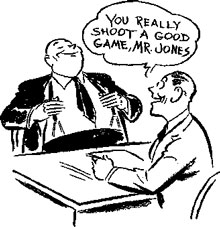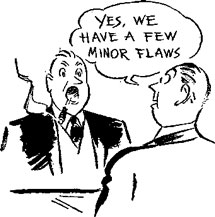 The year was 1947. Harry S. Truman was president, Chuck Yeager broke the sound barrier, and on October 17, 1947, the Manufacturers’ Agents National Association joined the community of not-for-profit trade associations.
The year was 1947. Harry S. Truman was president, Chuck Yeager broke the sound barrier, and on October 17, 1947, the Manufacturers’ Agents National Association joined the community of not-for-profit trade associations.
To celebrate our 70th MANAversary year, each Agency Sales magazine through October will include a “blast from the past” article from the early issues of The AGENT and Representative magazine, which eventually became Agency Sales.
These nostalgic looks back at how our counterparts from seven decades ago conducted their businesses and their lives are really eye-opening, in some cases because they conducted their business so differently from a modern manufacturers’ representative, and in some cases because it seems that nothing has changed in all that time. Enjoy!
The Selling Parade
By Chas B. Roth
(Reprinted from December 1949 The AGENT and Representative magazine)
A Digest of Successful Selling Ideas
Don’t Forget Praise
 When all is said and done, there’s hardly anything anyone wants more than honest, sincere, heartfelt praise. And when all is said and done, there’s hardly anything anyone gets less often than honest, sincere, heartfelt praise.
When all is said and done, there’s hardly anything anyone wants more than honest, sincere, heartfelt praise. And when all is said and done, there’s hardly anything anyone gets less often than honest, sincere, heartfelt praise.
Example: One business man noticed a fine achievement by another business man, his friend. He thought he would write a letter of congratulation. But he didn’t. After a few days of putting off, he told himself, “Shoot! He will get hundreds of other notes about it, so I won’t bother him with mine.” A few months later he met his friend on the street, told him how it happened that he had failed to send a note. “How many do you think I did receive?” asked the friend. The first man guessed scores, maybe hundreds. The answer was: “Not one.”
In selling it’s particularly important that a man be on the lookout for praiseworthy achievements that he can acknowledge with notes or words of praise, for salesmanship is always the highest of all human ceilings, and if anything will enhance a human’s sense of self-importance or feeling of friendliness toward another, it’s a salesman’s job to do that thing.
There is a danger, I grant, that if you praise too much you may become classed as a mere flatterer — and no one likes a flatterer. You can avoid that, however, avoid it easily, merely by being sincere, in your own mind, restrained in your praise, and then using worthy things to praise.
One man I know is so adroit as a praiser of his prospects and customers that he had cultivated the human side of his job to the point where literally thousands of men go out of their way to recommend him to friends. No one ever considers that he deals in flattery. He doesn’t. He is so sincere, his praise is so heartfelt, his method is so conservative, that his praise is accepted as pure gold—and is valued about as highly.
Praise more — sell more. That is one rule of salesmanship.
Smoke ’Em Out
If you knew exactly what was behind every stall a prospect pulled on you; if you were sure the reason a customer gives for not buying is the real reason for not buying, this job of selling could be done by anyone.
But the stalls that whip you are usually the hidden stalls — things your prospects say that aren’t true at all. How can a salesman smoke out these hidden stalls?
First, use direct questions. “I know something is holding you back. Would you mind telling me just what it is?” Or: “Be more frank with me, won’t you? Is it finances, or what that is holding you back?”
Second, finesse questions. “As a special favor, I wonder if you would mind answering a question in my mind?” Usually he won’t. Then ask the question.
Third, flattery: “Let’s forget I am here as a salesman and you are a buyer. Let’s pretend we’re just two business men talking things over. I ask your opinion of this product. There must be something wrong with it you haven’t told me or you would have bought it. I would certainly appreciate your telling me frankly what you think.”
Usually that’s all you need to smoke out a hidden stall — recognize it as hidden and go in after it with one of these techniques.
He Told Stories
The scene was sad. The prospect had just said no, he wasn’t going to buy. That was the end of it. He had made up his mind. There was nothing more the salesman could do but pack up his samples and look for more fertile ground.
So this is exactly what he was doing. And, as I say, the scene was sad, for a salesman’s failure is always a sad, sad thing. Only this salesman, who later became vice president in charge of sales for an immense corporation, didn’t need anyone’s pity. He could take care of himself all right.
His hand was on the knob, goodbyes were all said, hands were all shaken, and the curtain was about to fall, when the salesman turned, smiled ingratiatingly, and said, “Oh, I almost forgot something important. Glad I remembered it. If you’ve just a minute I’ll tell you about it.”
And then he told a story. It was a fascinating story, and the prospect was enthralled. There was drama in that story. Suspense. Heart tugs. Adventure. Real people marched into the life of the prospect, people like himself, with his same problems, his same hopes and aspirations. He leaned forward so as not to miss a word.
Before he knew it, this prospect who just a minute ago was declaiming all interest in the salesman’s goods, was listening again to a sales talk, for that’s what the story led into — a reopening of the talk which the prospect had terminated when he said no, no, no.
Of all the men I knew none was more adroit at using narrative selling than this salesman; of all the salesmen I have known none was more successful, for narrative selling always makes a salesman successful.
See if you can work up a few stories you can tell your prospects — stories of what others did with your goods, success stories, stories of real people doing real things.
Those prospects of yours know what to do with stories: they put themselves in them, for that’s the way we human beings do things. And if they see themselves enjoying your goods, making a profit on your line, they will buy — yes, they will buy even after telling you they won’t buy!
The Whole Truth
There are some salesmen, I know, who still believe truth is something, as Mark Twain once remarked, to economize, because it is so rare. They are seldom the best salesmen. On the other hand, there are salesmen who believe in “standing foursquare to every wind that blows” in telling their sales talk. They won’t exaggerate by a hair. They tell the whole truth, nothing but the truth. And sell tremendously well!
As a matter of fact, one quality which it would pay a salesman to investigate is the quality known as restraint.
James Wallen, able salesman with the printed word, looked into 1000 of the most successful sales letters ever written. Without exception, he found, restraint marked these letters. They didn’t overstate. They erred on the other side — they understated their case.
There is a power to understatement which is so great that no amount of bombast, hyperbole or exaggeration can match it.
 One very good salesman I know always starts in by pointing out minor flaws in his product. Of course he offsets these flaws with the description he gives later of the plus points in its favor, but he conditions the prospect to truth by showing he can point out bad points as well as good. He is tremendously successful.
One very good salesman I know always starts in by pointing out minor flaws in his product. Of course he offsets these flaws with the description he gives later of the plus points in its favor, but he conditions the prospect to truth by showing he can point out bad points as well as good. He is tremendously successful.
Truth is still a sales aid. Too bad more salesmen don’t use it.

